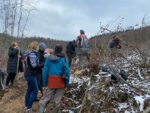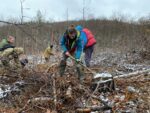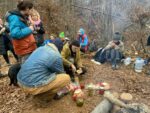Reversed logging
In the balkan mountains there is a lot of forrest. Well in most areas I mean. Some areas have become the victim of logging where a piece of forrest is completely cut away without taking into account the effects on water retention, soil deprivation or biodiversity. Therefore, reforestation actions are very much needed to reverse this. When reforesting, native tree species are planted strategically along the mountain side. Besides combatting soil erosion and enhances water retention, reforestation also increases carbon sequestration.
When we’re replanting forests, it’s really important to use plants that are native to the area. These are the kinds of plants that naturally grow in that specific environment. Why does this matter? Well, these local plants have adapted over time to the climate, soil, and other conditions of the region. So, when we plant them, they’re more likely to survive and thrive. They’re also better at handling local pests and diseases. Plus, using native plants helps keep the balance of the local ecosystem intact, preserving the natural relationships between plants, animals, and the environment. The local species we used were Blagun oak, wild pear and cherry, ash, maple and walnut.
With a group of about 35 people we were able to replant about 4 acres, which is 16% of the bare land. Another 21 acres remain so there is still some work ahead of us.
Of course there was also some time to chat with each other, play, have some warm tea and a nice lunch together.
Written by Camil





